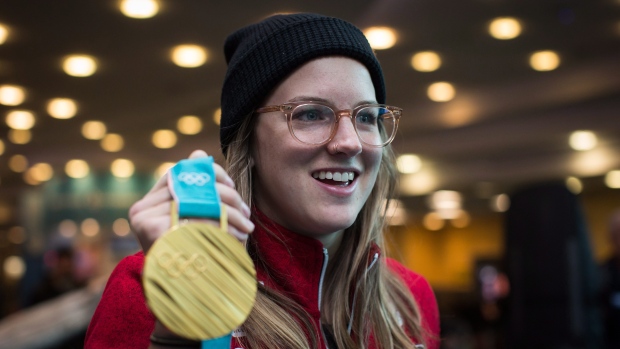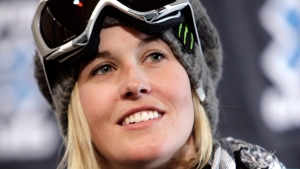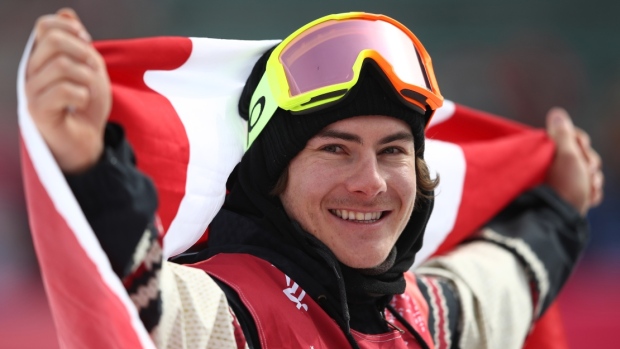Mar 4, 2018
Olympic champion Sharpe credits Burke for paving the way
Cassie Sharpe met the late Sarah Burke once in passing. That quick chat in Whistler may have been their sole interaction, but Burke’s influence on Sharpe’s gold-medal performance in Pyeongchang is paramount.

Cassie Sharpe met the late Sarah Burke once in passing.
That quick chat in Whistler may have been their sole interaction, but Burke’s influence on Sharpe’s gold-medal performance in Pyeongchang is paramount.
“I’ve learned lots of [Burke’s] wisdom through my teammates,” Sharpe told TSN.ca in a recent interview. “I feel like I connect with her and understand her love for the sport.”
Sharpe came into these Winter Olympics as the favourite in the women’s ski halfpipe and she didn’t disappoint. The Calgarian reached the top of the podium in South Korea, becoming the first Canadian woman to medal in the event that was making just its second appearance at the Olympics.

Following her golden victory, Burke’s mother messaged Sharpe and said Sarah would have been proud of the run she put down. High praise, as if it weren’t for Burke, the 25-year-old may have never been an Olympian in the first place.
A native of Barrie, Ont., Burke is arguably the greatest women’s ski halfpipe athlete in history. Over her career, she won five gold medals at the X-Games and was a world champion in 2005. However, Burke knew there was room for the sport to grow and that meant getting it on the biggest stage in the world – the Olympic Games.
Burke’s hard work and determination paid off as she successfully convinced the International Olympic Committee to add the event for the 2014 Winter Olympics in Sochi, Russia. She would have been one of the favourites in Sochi, as well, until tragedy struck on Jan 10, 2012.
During a training session in Utah, the 29-year-old Burke hit her head during a fall, going into cardiac arrest shortly later. She was rushed to a hospital in Salt Lake City where she had surgery to repair a torn artery and was in a medically induced coma. Following surgery, doctors discovered Burke had suffered irreversible damage to her brain due to lack of oxygen.

Burke passed away on Jan. 19.
Canadian freestyle ski coach, Trennon Paynter, spread some of Burke’s ashes on the course in Sochi before competition started in memory of Burke and her drive to get the sport to the Olympics.
After the post-Olympic hype calms down, Sharpe says she hopes to see Burke’s mother and husband to share the gold-medal glory that Burke pioneered for in women’s halfpipe.
“Just bring the medal back to them because it’s so much a part of them pushing for women and for the Sarah Burke Foundation and getting girls stoked,” explained Sharpe. “I tried to make a bit of a pie chart out of my medal. This is who this medal is for. It’s not just mine.
“We wouldn’t be here without her. She pushed herself and the sport to a point where now women are reaping the benefits of what she pioneered for us.”

In addition to Burke’s influence, part of Sharpe’s success comes from sticking to her style, something the skier values highly.
“I would rather have style and maybe a less-degree-of-difficulty trick than doing a really gnarly trick with no style and just getting points off of it,” said Sharpe.
What does this mean exactly?
Well, Sharpe says for the longest time in women’s freestyle skiing, competitors were just doing tricks to please the judges for a better score rather than sticking to their own preferred style and what they thought looked the best.
In Pyeongchang, Sharpe took out a trick that she thought looked bad and replaced it with a “truck driver,” a grabbing trick that was more akin to her personality.
“I think it looks good; I think it looks dope,” she said. “I’d rather have a lower degree of difficulty trick instead of putting in flair for a degree of difficulty that I think looks bad.”
Sharpe is also impressed with how much grabbing tricks have improved in women’s skiing.
“I’m really proud of how far women have come with grabbing tricks because that was a big criticism for a long time,” said Sharpe. “I think we’ve come a long way even in the four years that I’ve been on top of the circuit.”
So, where does Sharpe go from here after reaching the pinnacle of the sport?
Sharpe says there is still plenty to accomplish and that doesn’t necessarily mean winning competitions. Continuing to be true to her “style” is something that is highly valued in the sport.
“I won an Olympic gold, but I still feel like I can do more,” said Sharpe. “I can push the sport more. I can learn more tricks. I can have more style. I can grab more. I’d rather have the respect of the industry versus winning a gold medal just on a whim.”
Canadian dominance

Saying Canada does well on the snow may be an understatement.
The Red and White captured 11 medals in snowboard and freestyle skiing in South Korea, including five golds. Both teams are very deep with seemingly numerous contenders in each event.
Coming into Big Air, which was making its Olympic debut, everybody was talking about Mark McMorris and Max Parrot as the Canadians that could win gold.
That was perfectly fine for 25-year-old Sebastien Toutant, who made up for his 11th place finish in men’s slopestyle to win the first Olympic gold in Big Air.
Toutant says he used all the energy and support from his disappointing slopestyle finish to propel him to the top of the podium.
“I was like, ‘You know what, I don’t care if they talk more about other riders to be on the podium. I don’t care if they don’t talk about me.’ I didn’t really listen to anything, I was using all the good energy,” Toutant told TSN.ca. “I know I have the trick. I was riding well. I liked the jump so I was like ‘go for it.’”
Their sheer love for the sport is a major reason why the Canadian snowboard team performed so well at these Olympics, says Toutant.
“I think we like snowboarding so much and I think having a strong team makes us push ourselves even more when we ride together,” he said. “Someone learns a new trick, someone else tries it and we use that energy to do better and better.”
Sharpe concurs.
“We’ve got the best coaches in the world,” Sharpe said. “We’ve got the best courses in the world. You put all that together, you’ve got this awesome program - tons of support behind us and it just makes it really possible to do that.”
